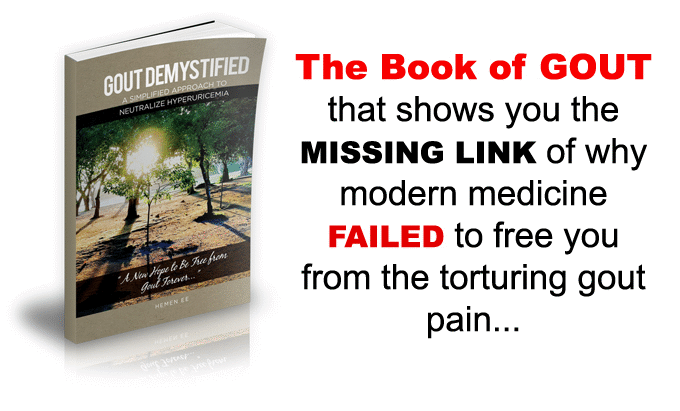Sometimes, when we are not feeling well we simply rely on our body’s innate ability to heal itself. You accidentally cut yourself? You do not have to do anything. Go chill and watch Netflix and literally do nothing. After a few days the wound is healed! Had a drinking party last night? Surely the liver sustained some damage. No worries! Your body will take care of the healing process for you.
Unfortunately, there are times that without help, the body will not be able to do anything. For instance, gout.
This article aims to explain how gout TEMPORARILY goes away by itself.
What Causes Gout
Gout is caused by your body’s homeostatic mechanisms that are meant to protect you. Your body is a genius when it comes to self-defense, unfortunately, false alarms can make you suffer. We both know that the pain and inflammation is ignited by your body if something is amiss, such as when infections occur. But what exactly is the body protecting you from that caused the gout attack?
As mentioned gout is caused by a false alarm. It is not a false alarm in a sense that the body has an imaginary enemy, but a false alarm where the body thought it can handle the enemy called URIC ACID CRYSTALS.
With too much uric acid in the body, your bloodstream will become acidic. This will be EXTREMELY bad for your health. Thus, the body will try to cope by hiding the acids, including the uric acid in the interstitial fluids in the tissue spaces. Soon, even your interstitial space will be full of acids, causing the body to cope once more. The uric acid seeps into the synovial fluids of the ball-and-socket joints. There, uric acid begins to crystallize.
Your body knows that crystals are not supposed to be in the joints hence organizing an attack against the vicious crystal. Your immune system will send in the neutrophils, a type of white blood cell that serves as your first line of defense. Sadly, there is just no way for them to defeat the crystal. Unlike bacteria that they can ingest, the uric acid crystal can not be engulfed by the neutrophils. This will cause the neutrophils to call for reinforcement. The signal they use? Pain and inflammation.
Alas, gout goes away. For how long?
As time passes by, the uric acid crystal will lay dormant. Without being stirred, it will not attract the attention of too much neutrophils to cause pain that is significant enough for you to feel. Unfortunately, it is highly unlikely that the uric acid crystal will dissolve by itself. In the first place, it will not crystallize if it has good solubility. If it has, it should have dissolved prior to crystallization. Furthermore, the growth of the crystal will be exponential! At first, when the saturation point is reached (which is reached more easily in cold temperatures), the uric acid will form a seed crystal. If a uric acid molecule collides with the crystal, they fuse and grow a little larger. The chance of such incidence is very small, but increases as the seed crystal enlarges. Therefore, once you experience a gout attack, the crystal will grow faster than it will dissolve. Sooner or later, gout will attack once again as the uric acid crystal begins to grow.
Now let us assume that the sufferer gave his body a helping hand by refraining from purine rich foods. Will gout go away? Sadly, no. Without further help the uric acid crystal will stay as it is.
The Solution
It may seem that there is only one criminal here: uric acid! But, the truth is there is a mastermind behind all these perfectly executed schemes. Acidosis.
As the name itself suggest, acidosis is the condition of too much acidity in the body. This adds an additional burden to the liver and the kidney, as those organs are not only responsible for the excretion of uric acid but the excretion of acids in general. This means that its attention will be divided among excreting the acids. This gives means that fewer uric acid will be expelled making uric acid accumulation much easier.
To cure your gout you have to eliminate uric acid, but this task is impossible without eliminating acidosis.

Comments
Post a Comment